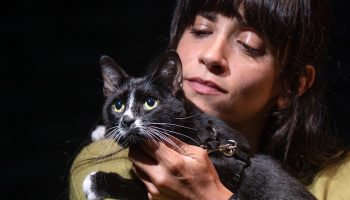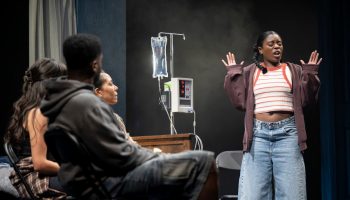
Julia Weber
Staff writer
Chautauqua Theater Company’s 2025 FutureNow Stage Directing Fellows will bring their talents to the stage at 2 p.m. and 7:30 p.m. today in Bratton Theater for “A Showcase of One Acts.”
The FutureNow Stage Directing Fellowships are born out of a partnership with CTC and The Drama League, bringing early- and mid-career directors to the Institution to inform their creative practices and gain professional theater experience. CTC is one of three partnering professional companies at which The Drama League places selected individuals to engage in the fellowship.
This summer, the fellows are Kevaughn Harvey, who will direct Harold Pinter’s Victoria Station; Yojiro Ichikawa, who will direct August Strindberg’s Pariah; and Fran de Leon, who will direct Matthew McLachlan’s 3 Characters Figure It Out.
For the directing fellows, the program is an invaluable experience to gain real-world directing practice in professional theater settings. Today, each individual will apply their talents and the skills they have learned so far this season to the showcase.
Harvey said programs like this fellowship are helpful because they connect emerging directors with professional experiences, which can be hard to come by otherwise.
“Being a director, you can’t really just audition for a role,” he said. Oftentimes, you’ll get the opportunity to work after you’ve already had opportunities to work, so it’s a catch-22 there.”
de Leon said the experience has been a chance to receive individualized hands-on opportunities in directing. She said she particularly enjoys the specialized aspect of the program, which allows each director to work on their specific interests.
“What’s been great is how the three of us have had very individual and varied experiences here,” she said.
Throughout the directing process, the fellows have had opportunities to work with both conservatory actors and CTC leadership to hone their skills and improve their craft as artists. In having these conversations and rehearsals with other artists, the fellows have learned how to adapt classics in exciting, accessible and relevant ways for Chautauquans to engage with.
“The very first discussion I had with (producing Artistic Director Jade King Carroll), and also with the actors is how we can make it more accessible to the audience and for the performers, as well,” said Ichikawa.
For Harvey, working with conservatory actors has been an experience of “lateral mentorship,” which has allowed for reciprocal learning for both the emerging artists in both programs.
“I can learn from how they work as artists, they can learn as actors and they can learn from me as a director, and we’re all fumbling together but also honing our skills together and sharpening together in a way,” he said.
de Leon said she enjoys working with conservatory actors not only because of the wealth of talent they bring to the theater, but the kindness they bring, too.
“They’re so talented, and they’re kind humans. That’s also a priority for me is to be like-minded in our artistry and our process and approach, but also in our hearts,” she said.
For the fellows, directing is a gateway to understanding communities and cultures and sharing these relationships with the audience.
“When I direct, especially if it’s for a specific community, I love to figure out how I put this community’s stamp on it,” de Leon said. “When you allow that to frame it in that sense, to give the audience ownership over the piece, it’s theirs; it’s being created just for them.”
For Ichikawa, directing is about finding “a new way to tell stories.” To him, the theater is a space where audiences and artists alike can free their imagination.
“I always enjoy the differences and the contrast of people’s skills, personalities, backgrounds, all these kinds of things, because the differences — the gaps — will create something new if we manage to communicate with each other,” he said.
Ichikawa, who recently moved into directing more traditional theater after working mostly on musicals, said between different types of theater and storytelling, more often than not, the message was the same.
“What I noticed was that the focus is always the same; it’s always about a truth of life, a truth of humanity that the theater culture is trying to portray,” Ichikawa said.




